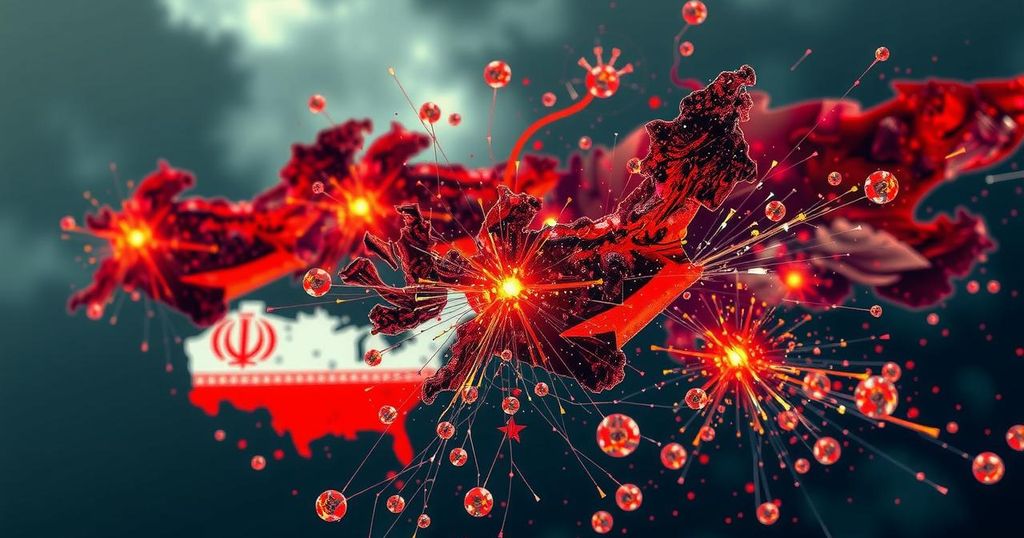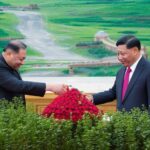Emerging Concerns: The New ‘Axis of Evil’ among China, Russia, North Korea, and Iran
U.S. officials are concerned about a rising alliance among China, Russia, North Korea, and Iran, dubbed a new “axis of evil.” This apprehension grew after reports of North Korean troops in Russia amid military cooperation in the Ukraine conflict. The collaboration suggests a potential destabilizing impact on global security, drawing historical comparisons and prompting calls for decisive action from the U.S.
U.S. officials have expressed growing concerns over a burgeoning alliance among China, Russia, North Korea, and Iran, often referred to as a new “axis of evil” reminiscent of historical precedents in the late 1930s. These apprehensions intensified following remarks from U.S. Defense Secretary Lloyd Austin, who confirmed the presence of North Korean troops in Russia, presumably gearing up for participation in the ongoing conflict in Ukraine. Simultaneously, Russia engaged in naval exercises with Iran, highlighting a collaborative military front. The strategic support among these nations during the Russia-Ukraine conflict is evident, as Iran has supplied missiles and drones, North Korea has delivered artillery shells, and China has contributed dual-use technologies. This cooperation was underscored by Republican Congressman Rob Wittman, who articulated the potential for destabilization, noting that the capabilities of these nations today far exceed those of Nazi Germany and its allies during World War II. Secretary of State Antony Blinken characterized this grouping as “revisionist powers” and highlighted a fierce competition shaping international relations. He further warned of the need for decisive action to counter their ambitions, as their collective choices could provoke a significant challenge to established global principles. While Blinken does not categorize these nations as a cohesive bloc, he acknowledges the inherent risks of their collaborative efforts. Opinions from policy analysts indicate that this partnership is not only seeking territorial expansion but is also working towards creating an economically self-sufficient zone that eschews reliance on Western economies. Christopher S. Chivvis of the Carnegie Endowment for International Peace remarked that the inclusion of China is critical; without China’s involvement, the dynamics among the other countries would lack the alarming potential for broader geopolitical strife. The interplay among these nations could result in crises across different regions, prompting coordinated military responses that may endanger U.S. interests. Analysts stress that this partnership could capitalize on regional conflicts to facilitate aggression elsewhere, encapsulating a prominent example where a crisis could escalate across multiple theaters of conflict. In reflection on their collective objectives, Blinken noted that the four revisionist powers share an intrinsic commitment to undermining U.S. influence and challenging the prevailing international order, an aspect that will continue to inform their interactions and alliances moving forward.
The topic at hand revolves around the growing strategic partnership between China, Russia, North Korea, and Iran, which some U.S. officials are labeling as a new “axis of evil.” This emerging alliance is perceived as a significant threat to U.S. interests and international stability, particularly in light of their collaborative military actions and support for each other amid ongoing global conflicts, notably the war in Ukraine. The discourse includes historical comparisons to past alliances that precipitated global conflicts, as well as discussions on the implications this partnership holds for U.S. foreign policy and global security.
In summary, the alliance forming among China, Russia, North Korea, and Iran poses considerable challenges to U.S. foreign policy and global stability. As these nations increasingly collaborate on military and economic fronts, the potential for crisis escalation across regions grows. The explicit commitment of these countries to undermine U.S. influence in the world adds another layer of urgency for assessment and response from Western powers.
Original Source: www.voanews.com








Post Comment